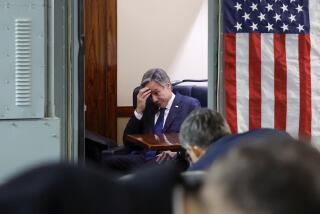U.S. Rejects Kadafi Hints, Has Nothing to Say to Libya
- Share via
WASHINGTON — The Reagan Administration declared Wednesday that it has nothing to say to Libya, rejecting Col. Moammar Kadafi’s hints that he wants to discuss the Gulf of Sidra, terrorism and other disputes between the two nations.
“There have been several published offers to mediate between the United States and Libya,” State Department spokesman Bernard Kalb said. “The United States has not responded because there has been no need for mediation or go-betweens.
“If the Kadafi regime wants to improve its international acceptability, it knows precisely what it must do,” Kalb said. “It must cease its unacceptable policies and actions and show it is prepared to become a member of the civilized community. It must cease its support for terrorism. It is a lack of action--a lack of terrorist action--that is important.”
The Reagan Administration has blamed Libya for the Dec. 27 terrorist attacks on airports in Rome and Vienna. It also accuses Kadafi of sponsoring, training and financing terrorists to operate worldwide and of sending “hit squads” to assassinate Libyan dissidents living in Europe.
Other U.S. officials said Kadafi repeatedly used European and Mideast intermediaries to ask for talks with Washington after the two airport attacks, but the Reagan Administration rebuffed each of those overtures.
“They (the Libyans) have tried repeatedly to talk to the United States, and they’ve gotten spit on,” said a source with close ties to the Tripoli regime. “It is unbelievable to me that the United States treats other countries that way.”
Kadafi’s only contact came in early January when William A. Wilson, the U.S. envoy to the Vatican, met secretly with the Libyan leader. Secretary of State George P. Shultz reprimanded Wilson for a breach of the U.S. policy of isolating Kadafi.
Shultz said he knew nothing about Wilson’s trip before it was made. He told reporters that the envoy “now understands” Washington’s refusal to talk to Kadafi.
The Administration stressed its refusal to talk to Kadafi before Vice President George Bush’s 10-day trip to the Arab countries around the Persian Gulf, which begins today.
Bush’s first stop will be Saudi Arabia, and U.S. officials expect the Saudis to suggest that Washington reopen contacts with Libya. The Administration clearly wants to nip such a proposal in the bud.
No Defense Possible
The vice president said at a news conference Tuesday that he will reject any defense of Libya he might hear in Saudi Arabia, Bahrain, Oman and Yemen.
“I know that some countries publicly have not taken too kindly to what we did, but if that is raised with me, I will tell them right directly how strongly we feel about Kadafi, what a menace he is,” Bush said.
Kadafi sent two senior officials--Khuwailidi Hamaidi, a member of the Revolutionary Command Council, and former Foreign Minister Ali Tureiki--to Saudi Arabia last week after the U.S.-Libyan military confrontations in the Gulf of Sidra, an inlet of the Mediterranean Sea. American officials believe that the purpose of their trip was to urge the Saudis to try to mediate in the dispute.
King Was Not Impressed
The Washington Post reported Wednesday that Kadafi telephoned Saudi King Fahd on March 25, one day after the first exchange of fire in the gulf. The newspaper said the king found Kadafi “incomprehensible and disoriented.”
Meanwhile, Pentagon officials told the Associated Press that the Navy battle group that confronted the Libyans last week has begun dispersing to various European ports on liberty.
The three aircraft carriers and supporting warships have been anchored at sea off Sicily since late Friday, a day after completing maneuvers in and near the Gulf of Sidra.
The ships are now authorized to make liberty calls in Spain, Italy and France, the officials said, adding that the ships’ movement has nothing to do with Wednesday’s explosion on a Trans World Airlines plane during a flight from Rome to Athens.
More to Read
Sign up for Essential California
The most important California stories and recommendations in your inbox every morning.
You may occasionally receive promotional content from the Los Angeles Times.













